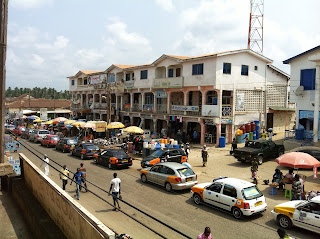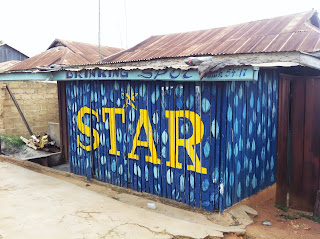After
a week in Accra the group forged into new territories and made its way to the
central part of the country and into Agona Swedru. This is a new venture for
Warwick in Africa and thus for the teachers in the local area.
For
context, the closest cashpoint that accepts foreign cards is two hours away.
People take out their phones to snap away pics of the 'white people on a bus!'
Openly, we get stares and smiles. Our school is a forty minute drive down dirt
roads; this is the 'close' school. And on our way home from the close school,
Ellis, our driver, hit a baby goat napping in the middle of the road.
And
still.
Swedru
is charming. Hardly a tourist destination and absolutely off the beaten path.
But it's real in a way that a big city can never be. Let me
explain--London is a shoddy representation of how England lives. It's full if
immigrants (of which I am one), it carries a bulk of the country's wealth,
universities, jobs and infrastructure. It's easy to see extreme wealth standing
proudly next to extreme poverty. And in many ways, Accra is the same.
In
Swedru, what you see is what you get. The community is relatively rural--corn
fields and palm trees stand side-by-side. But the houses we've seen are a lot
more solid--less shack like structures and more concrete buildings. There's a
greater Muslim influence here too--Islamic schools and mosques dot the area.
Nobody bats an eyelid. Life revolves around the local church or mosque and
people seem to care about each other. It makes me wonder when western society
became so insular, so selfish and so blatantly consumerist.
As
for the schools, the ones we've seen and been in are more cared for. They seem
more modern than their Accran cousins, and the campus of the senior high school
we're teaching at is similar in size to Hornsey.
In
town, a huge market splits the area in two. It's a true market--with foods and
smells and goods for sale. Like any true market, it assaults the senses; smoked
fish seem to be the thing for sale here, vendors beckon you to buy their fish,
their spices, their truly gigantic snails. No one hassles or heckles you
though--you are free to browse as you please. Another welcome change from
Accra. And if you venture back, you'll find stalls and stalls of fabric,
tailors and seamstresses. Fabric is inexpensive and getting something made is
even cheaper. I've paid 15 cedi, the equivalent of £5 ($7) to have a
shirt made for Paul.
The rest of the town's streets are dotted with shops, a small grocery store selling British biscuits imported from China with mandarin script on the side, various tailors, coffin sellers and ridiculously named store fronts. There is also one restaurant: Sizzlers, that sells an array of Ghanaian food alongside burgers, chips and pizza.








No comments:
Post a Comment